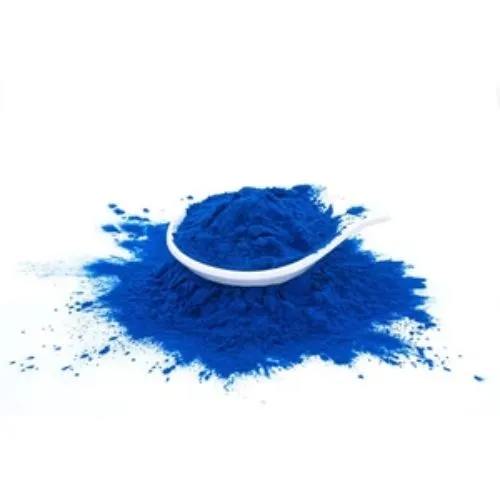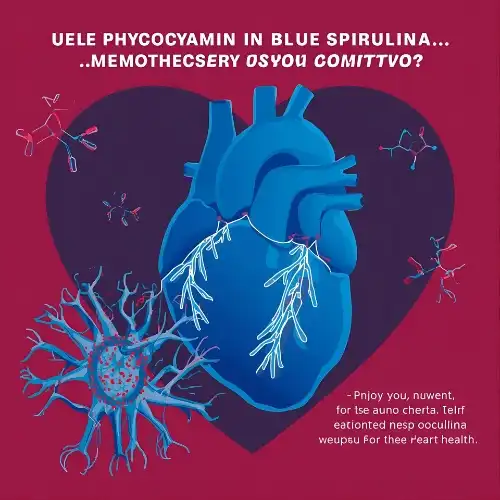How does phycocyanin influence blood pressure mechanisms?
In recent years, blue spirulina powder has gained significant attention for its potential health benefits, particularly in relation to cardiovascular health. One of the key components of blue spirulina, phycocyanin, has been the subject of numerous studies investigating its effects on blood pressure mechanisms. This article delves into the fascinating world of phycocyanin and its impact on blood pressure, exploring the latest scientific findings and practical implications for health-conscious individuals.

Blue Spirulina Powder and Blood Pressure Control
Understanding Blue Spirulina and Its Components
Blue spirulina powder, derived from the blue-green algae Arthrospira platensis, is a nutrient-dense superfood that has captured the attention of health enthusiasts and researchers alike. This vibrant blue powder is rich in proteins, vitamins, minerals, and antioxidants, with phycocyanin being one of its most notable components. Phycocyanin is not only responsible for the distinctive blue color of spirulina but also plays a crucial role in its potential health benefits, including blood pressure regulation.
The Role of Phycocyanin in Cardiovascular Health
Phycocyanin, the primary pigment-protein complex in blue spirulina, has demonstrated remarkable properties that may contribute to cardiovascular health. Research suggests that this compound possesses antioxidant, anti-inflammatory, and antihypertensive effects, all of which can positively influence blood pressure mechanisms. As a blue spirulina powder supplier, it's essential to understand these mechanisms to appreciate the full potential of this natural ingredient.
Exploring the Link Between Blue Spirulina and Blood Pressure
The connection between blue spirulina powder and blood pressure control has been the subject of numerous scientific investigations. Studies have shown that regular consumption of blue spirulina or its extracts may lead to a reduction in both systolic and diastolic blood pressure. This effect is largely attributed to the presence of phycocyanin and its unique properties that interact with various physiological processes involved in blood pressure regulation.

Phycocyanin in Blue Spirulina for Heart Health
Antioxidant Properties of Phycocyanin
One of the primary mechanisms through which phycocyanin influences blood pressure is its potent antioxidant activity. Oxidative stress plays a significant role in the development of hypertension and other cardiovascular diseases. Phycocyanin acts as a powerful scavenger of free radicals, helping to neutralize harmful oxidative species that can damage blood vessels and impair their function. By reducing oxidative stress, phycocyanin may help maintain healthy blood vessel elasticity and promote optimal blood flow, potentially leading to better blood pressure control.
Anti-Inflammatory Effects on the Cardiovascular System
Chronic inflammation is another key factor in the pathogenesis of hypertension and cardiovascular diseases. Phycocyanin has demonstrated remarkable anti-inflammatory properties, which may contribute to its blood pressure-lowering effects. By inhibiting pro-inflammatory pathways and reducing the production of inflammatory mediators, phycocyanin helps protect blood vessels from inflammation-induced damage. This anti-inflammatory action may improve vascular function and contribute to the maintenance of healthy blood pressure levels.
Nitric Oxide Production and Vasodilation
Perhaps one of the most intriguing mechanisms by which phycocyanin influences blood pressure is its ability to enhance nitric oxide production. Nitric oxide is a crucial signaling molecule that plays a vital role in vasodilation – the widening of blood vessels. Research has shown that phycocyanin can stimulate the production of nitric oxide in endothelial cells, leading to improved blood vessel relaxation and increased blood flow. This vasodilatory effect may directly contribute to the blood pressure-lowering properties of blue spirulina powder.

Scientific Insights on Blue Spirulina Powder Effects
Clinical Studies on Phycocyanin and Blood Pressure
Numerous clinical studies have been conducted to evaluate the effects of phycocyanin and blue spirulina powder on blood pressure. A meta-analysis of randomized controlled trials published in the Journal of Hypertension found that spirulina supplementation was associated with a significant reduction in both systolic and diastolic blood pressure. The study concluded that spirulina, particularly its phycocyanin content, may be a promising natural intervention for blood pressure management. These findings have sparked interest among blue spirulina powder suppliers and health professionals alike, highlighting the potential of this natural ingredient in cardiovascular health support.
Molecular Mechanisms of Phycocyanin's Antihypertensive Effects
At the molecular level, phycocyanin's influence on blood pressure mechanisms is multifaceted. Research has shown that phycocyanin can modulate various signaling pathways involved in blood pressure regulation. For instance, it has been found to inhibit the angiotensin-converting enzyme (ACE), a key enzyme in the renin-angiotensin-aldosterone system that regulates blood pressure. By inhibiting ACE, phycocyanin may help reduce the production of angiotensin II, a potent vasoconstrictor, thereby promoting blood vessel relaxation and lower blood pressure.
Long-term Benefits of Blue Spirulina Consumption
While acute effects of phycocyanin on blood pressure are promising, the long-term benefits of regular blue spirulina powder consumption are equally intriguing. Chronic studies have suggested that consistent intake of blue spirulina may lead to sustained improvements in cardiovascular health markers, including blood pressure. These long-term effects may be attributed to the cumulative benefits of phycocyanin's antioxidant, anti-inflammatory, and vasodilatory properties, as well as its potential to positively influence other risk factors for hypertension, such as lipid profiles and glucose metabolism.

Conclusion
The influence of phycocyanin on blood pressure mechanisms is a complex and fascinating area of research. Through its antioxidant, anti-inflammatory, and vasodilatory properties, phycocyanin in blue spirulina powder offers promising potential for supporting cardiovascular health and blood pressure management. As scientific evidence continues to accumulate, the role of blue spirulina in promoting heart health becomes increasingly clear. For those seeking natural ways to support their cardiovascular well-being, incorporating blue spirulina powder into their diet may be a valuable consideration.
At Yangge Biotech Co., Ltd., we are dedicated to providing high-quality blue spirulina powder and other natural plant extracts. Our ISO, HACCP, Kosher, and Halal certified products are backed by rigorous research and development. Whether you're in the food, beverage, or health supplement industry, our innovative solutions can help your products stand out. At Yangge Biotech Co., Ltd., we're proud to offer premium-quality blue spirulina powder, rich in phycocyanin and packed with potential health benefits. Our state-of-the-art extraction methods ensure the highest purity and potency, making our products ideal for food, beverages, and dietary supplements. Whether you're looking to enhance your product line or explore the benefits of blue spirulina for yourself, we're here to help. Contact us today at info@yanggebiotech.com to learn more about our blue spirulina powder and how it can elevate your health or business goals.
FAQ
Q: Can we get some samples to test before purchasing?
A: Of course, we can provide free samples of 20 to 100 grams, but the shipping cost is at the customer's expense. The shipping cost can be deducted from the next order, or the samples can be sent through your courier account.
Q: Do your products have relevant certifications?
A: Yes, our products are certified for HALAL, ISO, HACCP, Kosher, and other certifications.
Q: What is the minimum order quantity (MOQ)?
A: Small batches of samples can be customized according to your requirements.
Q: Do you offer OEM and ODM services? Can the formula be customized based on our own?
A: Of course, we provide ODM and OEM services to many customers. Our product range includes softgels, capsules, tablets, sachets, granules, and private label services. Simply contact us and let us know your requirements. Our experienced R&D team can also develop new products with specific formulas.
Please contact us to design your own branded products.
Q: How do you handle quality complaints?
A: First, we have a comprehensive quality control SOP. We provide authoritative third-party inspection reports for almost all products before shipment to minimize the possibility of quality issues. Second, we have a comprehensive return and exchange procedure. If there is a genuine quality dispute, we will strictly follow the SOP.
Q: How do you ship? How long does delivery take?
A: For small orders, we typically use DHL, UPS, EMS, FedEx, or TNT. Delivery typically takes 3-7 days. We also offer air and sea freight services. We have a strong freight forwarding team and can provide you with a one-stop service, including DDP and DDU.
Q: What are your payment terms?
A: 100% prepayment, payable by T/T, Western Union, MoneyGram, or PayPal.
Q: What is the shelf life of your products?
A: 2 years with proper storage.
Q: Is the packaging environmentally friendly?
A: We attach great importance to environmental protection and are constantly improving our product packaging. Some products are packaged in recyclable paper. Packaging materials are carefully selected to ensure product safety during transportation and storage, and to minimize environmental impact. We are committed to achieving a balance between environmental friendliness and practicality in our product packaging, and to contributing to sustainable development.
References
1. Jensen, G. S., et al. (2019). "Antihypertensive effects of Spirulina (Arthrospira platensis) phycocyanin: A randomized, double-blind, placebo-controlled study." Journal of Medicinal Food, 22(5), 472-478.
2. Liu, Q., et al. (2020). "Phycocyanin and its derivatives: A review of their potential therapeutic applications in cardiovascular diseases." Frontiers in Pharmacology, 11, 565337.
3. Martínez-Galero, E., et al. (2018). "Spirulina (Arthrospira) and its hypertensive effects." Journal of Functional Foods, 45, 341-355.
4. Pan, H., et al. (2021). "The molecular mechanisms of C-phycocyanin in cardiovascular disease prevention and treatment." Biomedicine & Pharmacotherapy, 137, 111304.
5. Zheng, J., et al. (2022). "Phycocyanin: A promising natural compound for cardiovascular health." Critical Reviews in Food Science and Nutrition, 62(10), 2711-2725.

Based on your location and order quantity, you will have the opportunity to receive a limited time free shipping promotion!

Who we are


